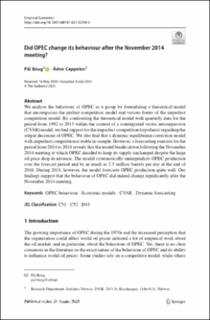Did OPEC change its behaviour after the November 2014 meeting?
Peer reviewed, Journal article
Published version
Date
2021Metadata
Show full item recordCollections
- Artikler / Journal articles [426]
- Publikasjoner fra Cristin [138]
Abstract
We analyse the behaviour of OPEC as a group by formulating a theoretical model that encompasses the perfect competition model and various forms of the imperfect competition model. By confronting the theoretical model with quarterly data for the period from 1992 to 2013 within the context of a cointegrated vector autoregressive (CVAR) model, we find support for the imperfect competition hypothesis regarding the output decisions of OPEC. We also find that a dynamic equilibrium correction model with imperfect competition is stable in-sample. However, a forecasting exercise for the period from 2014 to 2018 reveals that the model breaks down following the November 2014 meeting at which OPEC decided to keep its supply unchanged despite the huge oil price drop in advance. The model systematically underpredicts OPEC production over the forecast period and by as much as 2.5 million barrels per day at the end of 2016. During 2018, however, the model forecasts OPEC production quite well. Our findings suggest that the behaviour of OPEC did indeed change significantly after the November 2014 meeting.

